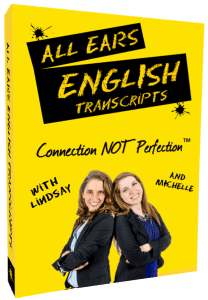
You’ve heard us talk about the “nuances” of English many times before, but do you know what this means?
We’re going to help you to understand what nuances are and why they have such an important place in your conversations and your English learning in general.
Get Your Transcripts

Make sure you understand every word you hear on All Ears English.
Bring your English to the advanced level with new vocabulary and natural expressions.
Get the transcripts from today’s episode.
Learn to speak naturally with the American accent.
We have a listener question about this very word.
Hey awesome hosts,
Lately you have been using the word “nuance” a lot. I’d like to understand a little bit more about what exactly this means.
Would you be able to create an episode talking about the usage about “nuance”? This would really help us to understand it better.
Thanks a million for your help!
Xiaojun Xu
Expressing Differences
It’s true that this word is used on the show all the time.
So understanding what it means can be very important in working towards proper usage.
So what does it mean?
Nuance is a noun, and according to the dictionary, it means “a subtle difference in or shade of meaning, expression, or sound.”
You might hear us say something like “We want to add more nuance to your English.”
You might hear us say something like “It’s important to have nuanced English because it makes you a more interesting speaker. “
It’s a word that can be used in a variety of different ways, but it has a similar type of meaning.
Looking At This In A Certain Context
So let’s talk about this a little bit more focusing on the context of our show and language learning.
When we use nuance on this show, we basically are talking about adding “color” to your English.
This means that you are trying to make it more exciting, interesting, or personal.
Instead of saying “happy” or “sad” we like to teach you many different ways to say those words with slight variations.
An example might be to say you are thrilled or ecstatic for happy, or upset or disappointed for sad.
So what are the benefits of learning nuanced vocabulary and cultural situations?
As we said, using nuances can really help to make it more interesting and makes you more advanced in English in general!
You can choose your vocabulary past the basic textbook words and really show off what you know.
Making It More Personal
Nuances help to show your unique personality and lets you choose who you want to be in English.
Different people use different words and express themselves differently.
Language is so personal, and this is a perfect way to demonstrate that and embrace it.
It lets you choose appropriate language for specific situations and people.
You say one word to your friend but a different word to your boss.
Knowing these differences places you at an advantage and at a very high level.
It allows you to connect, and therefore it’s a really important tool to have easily accessible.
Making It All Your Own
Nuances are a great way to create a very personal experience.
Using different vocabulary and changing your English and mannerisms in many ways can help you connect with others.
Remember it’s about the words you say, the way you use them, and also the tone and way in which you deliver it.
For example, you can learn how to deal with different situations, such as if your friend is going through a difficult time, with specific language for them which can make relationships stronger.
Every little bit helps you to become more advanced with your language usage, and ensure that you take your conversations and relationships to a whole new level.
Takeaway
Nuance involves discussing subtle differences, which is so important for learning a language.
Understanding how to use this can really help you in your conversations.
Knowing nuanced English can help you in many different ways.
Try using this in conversation now that you know the meaning, and see how it can be a great way to communicate.
If you have any questions, please leave them below in the comments section.
We’ll get back to you as soon as we can.



